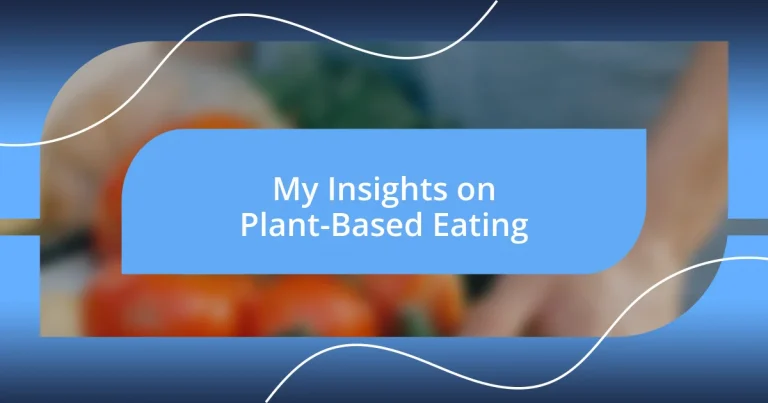Key takeaways:
- Plant-based eating enhances health by boosting energy, improving heart health, and reducing environmental impact through sustainability.
- Nutritional essentials like protein, vitamin B12, iron, and omega-3 fatty acids are crucial for a balanced plant-based diet to prevent deficiencies.
- Transitioning to plant-based meals can be enjoyable by starting with meatless days, shopping in bulk, and exploring community resources for support and inspiration.
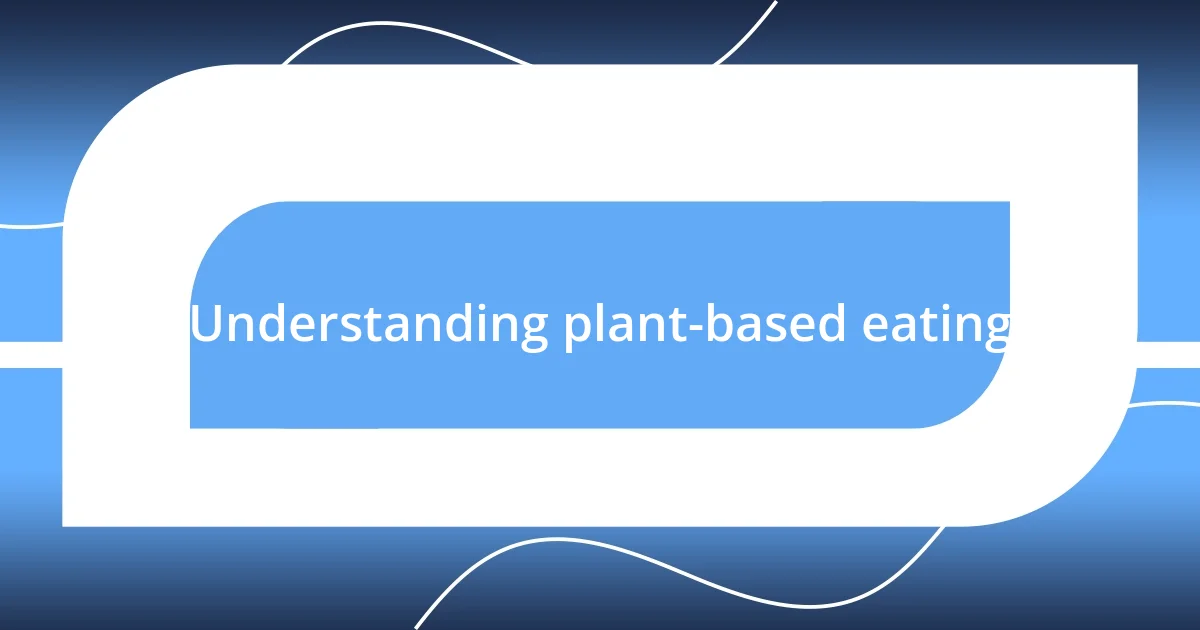
Understanding plant-based eating
Plant-based eating isn’t just a diet; it’s a lifestyle choice that emphasizes whole, minimally processed foods, primarily from plants. When I started incorporating more plant-based meals into my routine, I was amazed at how vibrant and energized I felt. Have you ever noticed the difference in how you feel after a light, plant-based meal compared to a heavy, meat-centric one?
At its core, plant-based eating encourages a variety of fruits, vegetables, whole grains, nuts, and seeds. I remember the first time I experimented with a creamy cashew sauce instead of traditional dairy; it was a game changer! The flavors were so rich, and I felt good knowing I was making a healthier choice. Isn’t it exciting to discover that such delicious alternatives exist?
Understanding plant-based eating also means recognizing the potential for personal connection and cultural significance in meals. I often reflect on family dinners, where plant-based dishes spark conversations about health, sustainability, and even our childhood memories tied to food. How does your relationship with food shape your understanding of what you eat?
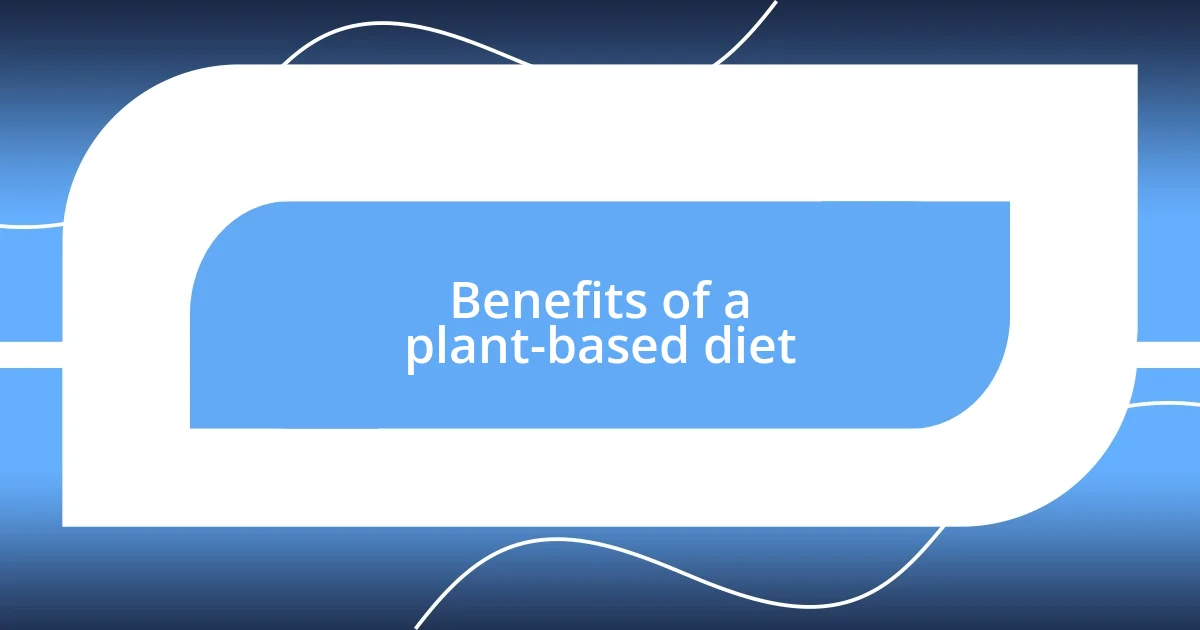
Benefits of a plant-based diet
One of the most profound benefits of a plant-based diet is its positive impact on overall health. Personally, after I made the switch, I noticed a significant decline in my energy dips throughout the day. It’s fascinating how foods rich in antioxidants, like berries and leafy greens, can transform your vitality. Have you experienced that lightness after a meal filled with whole foods?
In addition to boosting energy levels, a plant-based diet can also enhance heart health. By reducing saturated fats commonly found in animal products, I found my blood pressure stabilized, and my cholesterol levels dropped. It’s incredible how simply changing my plate could influence such critical aspects of my health. Have you ever looked at nutrition labels and wondered how certain foods affect your heart?
Lastly, eating more plants supports environmental sustainability. I learned that for every plant-based meal I have, I’m reducing my carbon footprint. When I sit down to eat a hearty lentil stew or a vibrant quinoa salad, I feel a sense of purpose. Doesn’t it feel rewarding to know that our choices can nurture not just our bodies but also the planet?
| Benefit | Details |
|---|---|
| Health Improvement | Boosts energy, reduces dips, improves vitality |
| Heart Health | Stabilizes blood pressure, lowers cholesterol |
| Environmental Impact | Reduces carbon footprint, promotes sustainability |
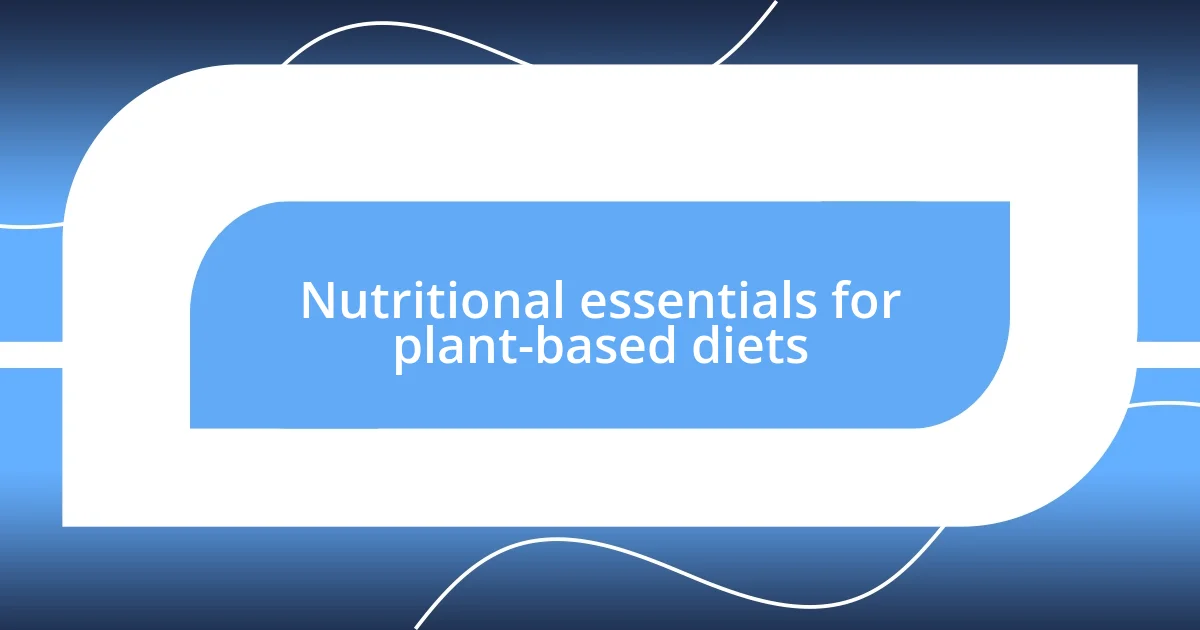
Nutritional essentials for plant-based diets
Nutritional essentials play a pivotal role in ensuring that plant-based diets meet all dietary needs. I’ve learned the importance of including a variety of nutrient-dense foods to avoid deficiencies. When I first transitioned, I found myself overwhelmed by the choices, but discovering rich sources of protein like chickpeas and lentils made my journey easier and more satisfying. Exploring new recipes became an adventure, especially when I realized how flavorful plant foods could really be!
Here’s a quick overview of some nutritional essentials to keep in mind:
- Protein: Focus on legumes, nuts, seeds, and whole grains.
- Vitamin B12: Consider fortified foods or supplements, as it’s primarily found in animal products.
- Iron: Include leafy greens, tofu, and quinoa; pair with vitamin C sources for better absorption.
- Omega-3 Fatty Acids: Flaxseeds, chia seeds, and walnuts are great options.
- Calcium: Choose fortified plant milks, leafy greens, and tofu for adequate intake.
- Zinc: Incorporate whole grains, legumes, and seeds to support immune function.
As I dived deeper into plant-based nutrition, I realized the significance of balancing my meals. I remember a period where I felt sluggish because I wasn’t paying attention to my nutrient variety. Once I introduced wholesome snacks like hummus with veggies or a smoothie with spinach and banana, my energy levels soared. Sometimes, I think we overlook the power of mindful eating—it’s not only about what we choose but how we combine it!
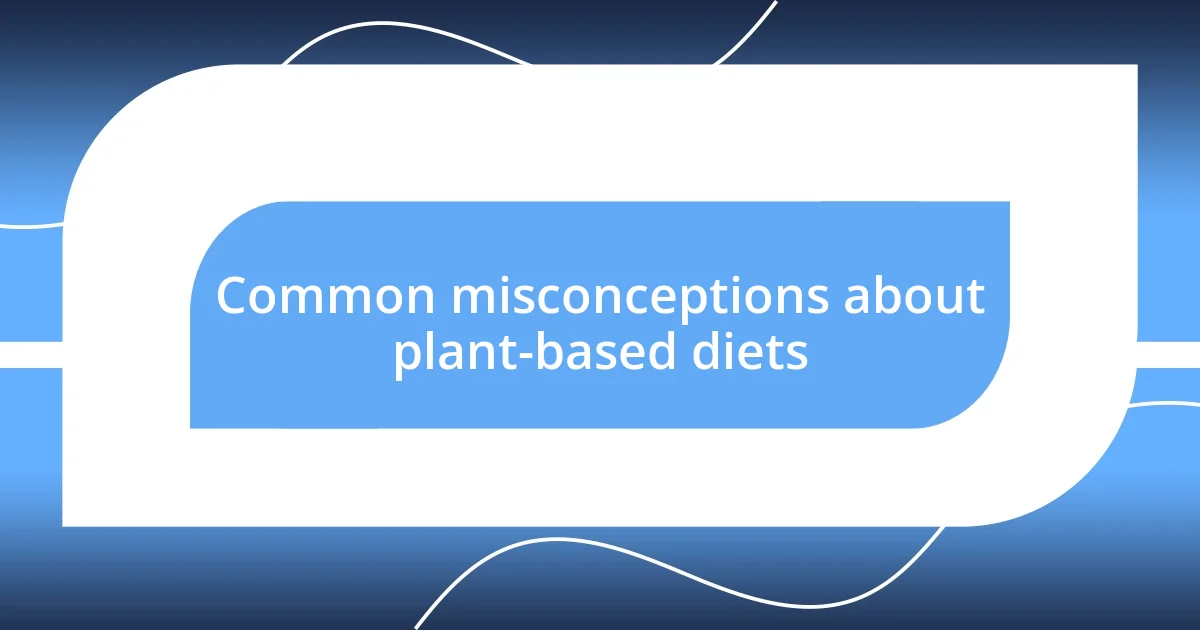
Common misconceptions about plant-based diets
Many people believe that a plant-based diet lacks sufficient protein. I used to think I needed meat for muscle recovery after workouts, but I’ve learned that foods like quinoa, lentils, and even broccoli can provide ample protein. Isn’t it ironic that we often look past the nutrient potential of plants?
Another common misconception is that plant-based eating is expensive. Initially, I was worried about the cost, but I quickly discovered that staples like beans, rice, and seasonal vegetables are often cheaper than meat. Plus, meal prepping not only saves money but also makes it easier to avoid the temptation of pricey takeout. Have you explored local farmer’s markets? You might be surprised by the deals!
Lastly, some people fear they might miss out on flavors and variety by going plant-based. I used to dread that I’d be stuck with bland salads, but my culinary adventures have proven otherwise! Experimenting with spices, herbs, and different cooking methods opened up a whole new world for me. Isn’t it amazing how transforming a simple vegetable into a flavorful dish can change your perspective on eating healthy?

Practical tips for transitioning
To make the transition to plant-based eating smoother, start by gradually incorporating meatless days into your week. I remember the first time I tried “Meatless Monday” – it was surprisingly liberating! Each time I skipped meat, I found myself exploring new dishes that I never would have considered before. Have you ever noticed how dedicating even one day to plant-based meals can open your culinary horizons?
Shopping in bulk can also be a game-changer. When I began buying legumes, grains, and nuts in larger quantities, not only did I save money, but my pantry became a treasure trove of meal possibilities. I often mix and match what I have on hand, which means I rarely feel boxed in by my options. It’s amazing how a little planning can lead to creativity in the kitchen!
Don’t underestimate the power of community or online resources! Joining plant-based forums or local groups gave me the support I needed during my transition. I still recall the joy of sharing my culinary successes and learning from others’ experiences. Engaging with fellow plant-based eaters can inspire you, provide tips, and maybe even lead to some lasting friendships. What are some resources you’re considering to keep you motivated?
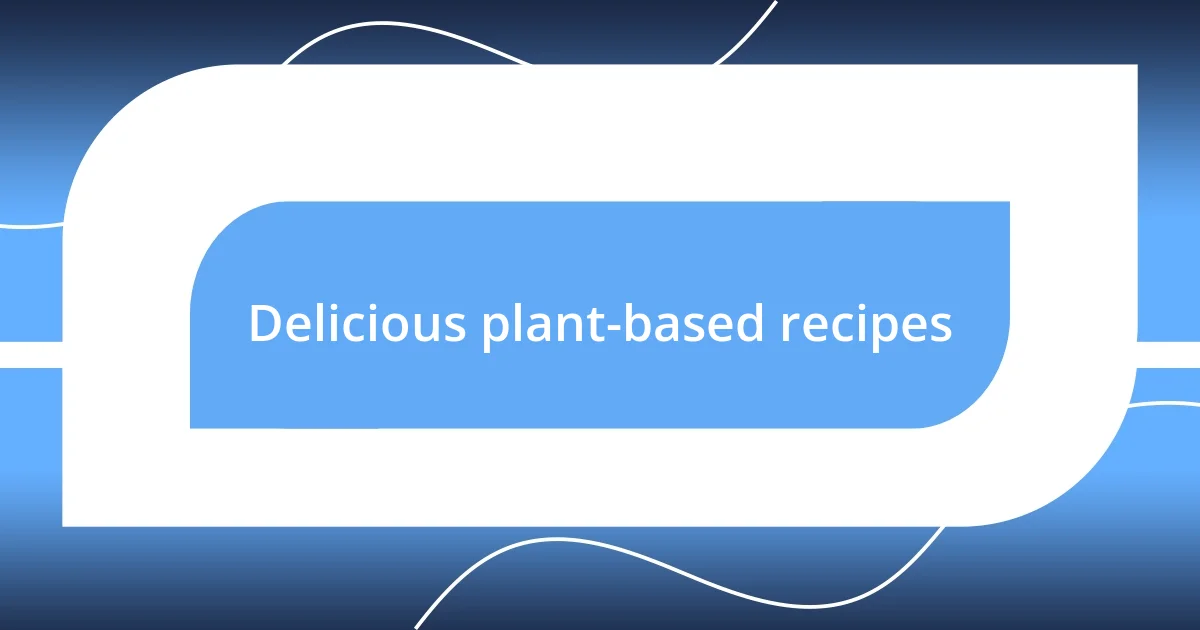
Delicious plant-based recipes
Embracing plant-based cooking can unleash your inner creativity, and I can attest to that from my own kitchen adventures! One of my all-time favorite recipes is a simple chickpea curry. The combination of spices like cumin, turmeric, and coriander creates an enticing aroma that fills your home. When I first made it, I felt like a gourmet chef! The best part? It’s quick to whip up and incredibly satisfying. Have you ever tried transforming pantry staples into a delicious meal?
Another delightful recipe I stumbled upon is a roasted vegetable quinoa salad that bursts with color and flavor. I remember bringing it to a potluck, and the compliments I received were unexpected. The sweet roasted peppers and zucchini meld beautifully with the nutty quinoa, while a drizzle of lemon-tahini dressing ties it all together. It’s a reminder that eating plant-based doesn’t mean losing out on taste or satisfaction. What are some of your favorite ingredients that could shine in a vibrant salad?
Let’s not forget about desserts! I’ve discovered a luscious vegan chocolate mousse made with avocados and cocoa powder that has completely changed my perspective on healthy desserts. At first, I was skeptical about using avocados in a sweet dish, but the creamy texture and rich flavor are undeniably satisfying. Sharing this with friends led to some pretty amazed expressions! It’s moments like these that remind me how delightful plant-based recipes can be. Have you dared to explore sweets in a new way?
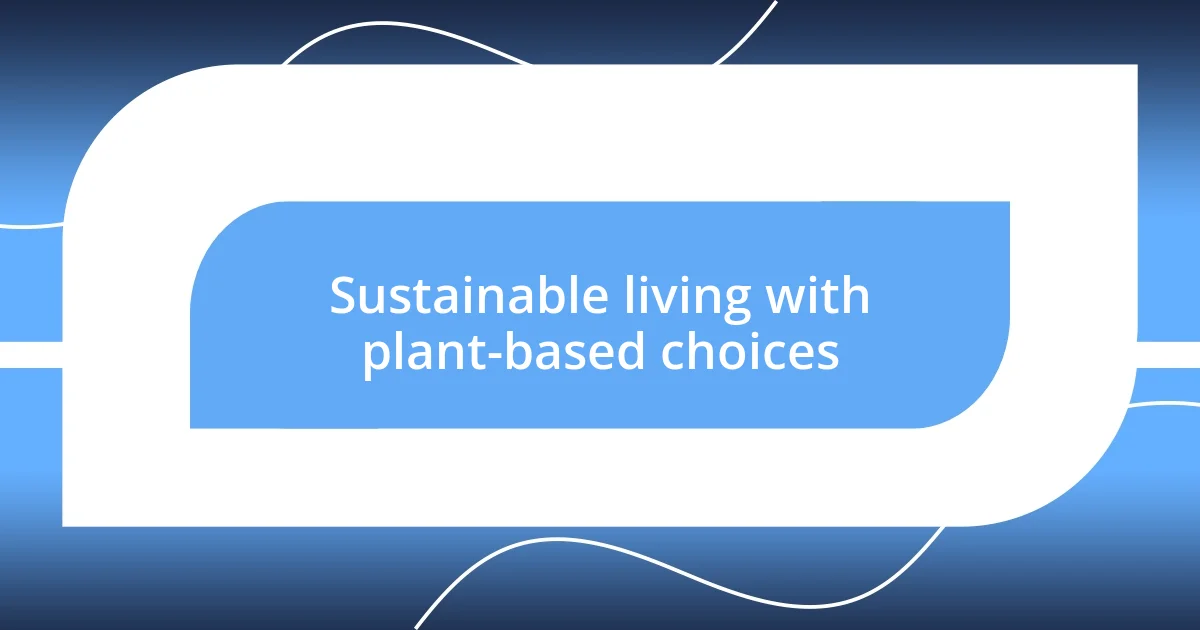
Sustainable living with plant-based choices
Choosing a plant-based diet not only nourishes our bodies but also contributes to a more sustainable world. I vividly remember the first time I learned about the environmental impacts of livestock farming – it was an eye-opener! Reducing meat consumption can significantly lower greenhouse gas emissions, something that motivated me to rethink my eating habits. Have you ever considered how your plate could make a difference for our planet?
Shopping for local, seasonal produce became a joyful experience for me. There’s something gratifying about supporting local farmers and knowing that the food on my table is fresh and has a smaller carbon footprint. I recall a lovely farmers’ market where I discovered heirloom tomatoes and vibrant greens, which inspired me to whip up a fresh salad bursting with flavors. It made me appreciate the connection between my food choices and sustainable farming practices. What colors and tastes await you at your local market?
Finally, I always emphasize the importance of reducing food waste in our pursuit of sustainability. Adopting a plant-based approach encourages me to utilize every part of the ingredients, whether it’s using vegetable scraps for broth or repurposing leftovers into a creative stir-fry. It’s rewarding to know that my choices not only bring nourishment to my family but also reflect a commitment to the environment. How might you embrace creativity and sustainability in your kitchen?












